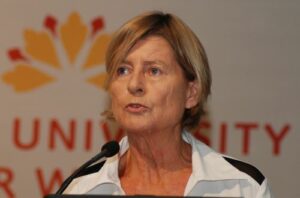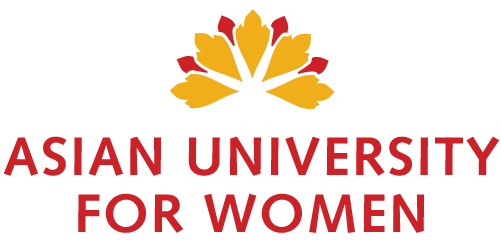AUW is honoring one of its earliest and most thoughtful, devoted, effective, and fearless co-founders: Lone Dybkjaer. The former First Lady and Environment Minister of Denmark, and leader in the European Parliament, was a passionate advocate for women’s equality and justice the world over. Lone passed away this past year after years of struggling with cancer. We wish to honor her legacy by establishing 10 endowed scholarships in her name.
I met Lone through a mutual friend from Aarhaus University around 1998 when we were assembling the World Bank/UNESCO Task Force on Higher Education and Society, chaired by Henry Rosovsky, which she joined as a member. Over the following two years I had many opportunities to closely interact with Lone as we participated in a number of meetings in Cape Town, Geneva, New York, Sao Paulo, and elsewhere. Always immaculately dressed, Lone was warm, engaging, interested, open, and, unfailingly, helpful. We invited her to join the Prime Minister of Bangladesh as the co-chair of the International Support Committee for AUW. Not only did she accept the invitation, but over the ensuing years, she gave all of her heart, soul, and energy in bringing AUW from concept to reality.
 In the year 2000 Lone came out to Bangladesh for a week. There, together, we presented the concept of AUW to the Bangladesh Prime Minister and other members of her Cabinet. It was during these conversations that we established the framework that would ultimately guide AUW’s creation through an Act of the Parliament, thus guaranteeing AUW’s academic freedom and institutional autonomy. Already there were some rumblings about AUW among some of the leaders of women’s civic organizations in Bangladesh — some arguing that a separate women’s university would be a throwback to the medieval past and must be avoided. There was also a false assumption that AUW would be a home economics college that would simply perpetuate the traditional domestic roles of women. We persuaded about a dozen of these leaders to take a day-long trip on a (slow) sailboat down Meghna river with Lone. Through the seven hour journey, Lone reasoned, cajoled, charmed, and, ultimately, won over everyone. If there was a clear moment marking the beginning of AUW, it was that week when the AUW idea was ratified by the political and civic leaders in the country. As with perhaps any new ideas, there was, in those early days, more skepticism and opposition than support. Yet throughout Lone’s belief in and passion for AUW persisted, and her commitment never withered through all the vagaries of our journey.
In the year 2000 Lone came out to Bangladesh for a week. There, together, we presented the concept of AUW to the Bangladesh Prime Minister and other members of her Cabinet. It was during these conversations that we established the framework that would ultimately guide AUW’s creation through an Act of the Parliament, thus guaranteeing AUW’s academic freedom and institutional autonomy. Already there were some rumblings about AUW among some of the leaders of women’s civic organizations in Bangladesh — some arguing that a separate women’s university would be a throwback to the medieval past and must be avoided. There was also a false assumption that AUW would be a home economics college that would simply perpetuate the traditional domestic roles of women. We persuaded about a dozen of these leaders to take a day-long trip on a (slow) sailboat down Meghna river with Lone. Through the seven hour journey, Lone reasoned, cajoled, charmed, and, ultimately, won over everyone. If there was a clear moment marking the beginning of AUW, it was that week when the AUW idea was ratified by the political and civic leaders in the country. As with perhaps any new ideas, there was, in those early days, more skepticism and opposition than support. Yet throughout Lone’s belief in and passion for AUW persisted, and her commitment never withered through all the vagaries of our journey.
Over the next several years, Lone remained deeply engaged with the work of AUW. Wherever we needed her, she would go: Bangladesh, New York, Kuwait, and so on. She came to New York to meet with the first group of potential supporters. She met with, among others, the former US Secretary of Treasury Robert Rubin and the late David Rockefeller. Barbara Crosssette, then serving as the UN Bureau Chief for the New York Times, interviewed her about AUW. The subsequent publication of Barbara Crossette’s article in the Times triggered the attention of a number of key people and institutions in the US who proved vital in the making of AUW.
One time she and I travelled to Kuwait for meetings with various high officials. We were told that the timing of the most crucial meeting could not be given ahead of time but that it would be some time within the three days we were planning to stay in Kuwait. We would get a call, they said, when it was time. Every day we would wait for the call but no call would come until just hours before we were to leave for the airport. Through all these hours of waiting, Lone never complained even though all the waiting around must have been quite exasperating. In between meals at the hotel, we had some other meetings, so we were not entirely idle the whole time. At the outset of a meeting with the Higher Education Minister, we explained AUW to him and where it would be located. Then, the Minister gestured enthusiastically by saying “I know Chittagong well.” Lone and I both moved to the edge of our seats, momentarily thinking we were about to get the support we were looking for. But, alas, the Minister then went on to say that he knew Chittagong because his cook was from Chittagong and the same cook had brought others from Chittagong to work in his household. We shrugged, and finished our meeting quickly. At the next meeting, Lone remained as optimistic about a positive outcome in spite of the harrowing disappointment from the previous one. Lone’s patience, sense of humor, and endless reservoir of hope kept us going in spite of all the disappointments. Today, Kuwait, thanks to the extraordinary commitments of Mrs. Lulwa Al-Mulla and Mr. Mohammed Al-Jalahma, has emerged as one of AUW’s most important supporters, enabling the university to provide opportunities for a hundred Rohingya refugee women.
The first official act in the creation of AUW took place in the halls of the European Parliament in Brussels in 2001, where Lone, in the presence of Pat Cox, the then President of the European Parliament, signed the MOU with the Government of Bangladesh. It would take several more years before the Parliament would ratify the AUW Charter, enabling AUW to open its doors to students in 2008. In 2010, Lone returned to Bangladesh to see first hand what her labors over the years had already produced. As if to complete the circle that initiated the University, she spoke at a launch event with over 1100 people in the audience alongside the same Prime Minister she had met in 2000 on her first visit. We are comforted that Lone was able to meet the students and faculty and even visit the raw campus site where next year, Inshallah, AUW will start construction of its own permanent campus.
In my correspondence with Lone’s husband, former Danish Prime Minister Poul Nyrup Rasmussen, in the aftermath of Lone’s passing, he wrote, “As you noticed, she was my beloved life partner and dearest friend…To live on without Lone therefore makes extra sense to me when I feel that her legacy is now being shared by an increasing number of people who have met and collaborated with (her). This is true in Denmark, Europe and internationally — in Bangladesh.” He went on to say that “Most other senior politicians at Lone’s level would have hesitated and passively assessed over time whether this idea was possible and sustainable. But it’s never been Lone… On the contrary, the challenge could almost stimulate her when it came to the future prospects of young women all over the world. AUW was, in the latest part of Lone’s long standing political life, one of her most important, most crucial projects. Lone saw the situation of women in Asia so clearly, saw that education was the key to emancipation, the key to women taking their natural place in society, on an equal footing with men.”
 Lone was a devoted friend to AUW and our cause. We were inspired by her, supported by her, and counseled by her through this long journey to create what Lone often referred to as a “new lighthouse” for women of Asia. With the consent of Lone’s husband, AUW is establishing ten endowed scholarships styled as Lone Dybkjaer New Lighthouse Scholarships. We aim to raise $2.5 million for this endowment as only the income from the corpus of the fund would be spendable in any given year. The scholarships will therefore be perpetual and the legacy of this great pioneer of AUW renewed, year after year, through the examples of students who, like Lone, believe in the promise of a “new lighthouse,” and do everything they can to carry on with their pursuit of justice and equality.
Lone was a devoted friend to AUW and our cause. We were inspired by her, supported by her, and counseled by her through this long journey to create what Lone often referred to as a “new lighthouse” for women of Asia. With the consent of Lone’s husband, AUW is establishing ten endowed scholarships styled as Lone Dybkjaer New Lighthouse Scholarships. We aim to raise $2.5 million for this endowment as only the income from the corpus of the fund would be spendable in any given year. The scholarships will therefore be perpetual and the legacy of this great pioneer of AUW renewed, year after year, through the examples of students who, like Lone, believe in the promise of a “new lighthouse,” and do everything they can to carry on with their pursuit of justice and equality.
We solemnly invite you to consider making a gift of whatever amount that is feasible for you to the Lone Dybkjaer Scholarship Fund at AUW and help our community remember and honor a leader whose tireless efforts helped bring about this institution. Attached you will find further details about giving to this Fund.
